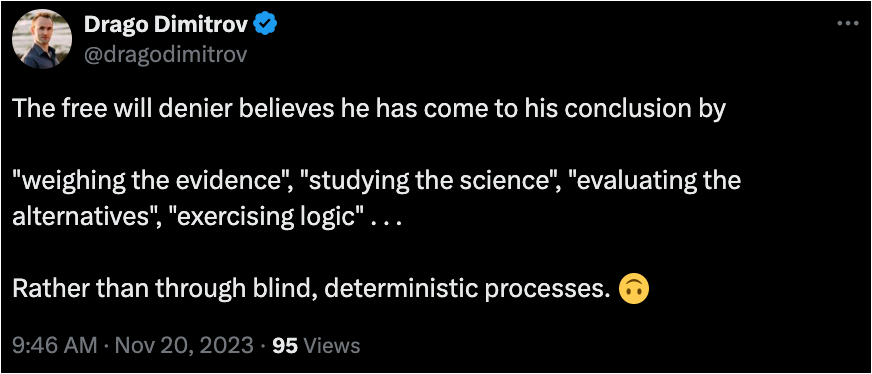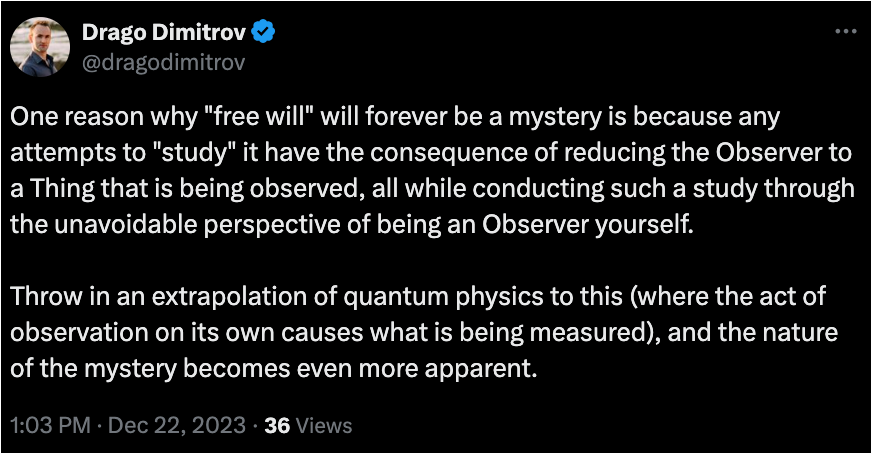Free Will Can Never Be Disproven
It's impossible, even in theory, to create an experiment that would ever prove or disprove free will. This is because free will is unfalsifiable... Prove me wrong! 😃
TLDR: Predictability, rationality, and causality in human decisions DO NOT negate the existence of free will
Imagine we were to conduct the following experiment:
Gather a group of 1,000 people
Give them each the following choice between:
A) Receive $1 million for free 💵
B) Receive $0 💨
Our hypothetical results:
990 (99%) people choose Option A and 10 (1%) people choose Option B.
(Why not 100%/0%? Because this is my hypothetical experiment. 🙂 And maybe the 1% holdout rebels didn’t trust the choices, misheard the instructions, or thought that the extra $1M will contribute to some seemingly insurmountable temptation…)
What would these results tell us about Free Will?
Nothing.
“But Drago,” one might say, “with results like these, we can predict with near 100% certainty which choice the people would pick. How could you claim that it would have been possible for the participants to have chosen otherwise? Where is the evidence for this ‘free will’ that you speak of?”
🙄
What does predictability have to do with free will?
Do you think that a 50/50 split between Option A and Option B would have been “better” evidence for free will?
Where would you get an idea like that?
What we see here is that people are simply operating based on the laws of Logic as applied to their values (now why they have similar values is a separate matter. . .).
Something like:
I want to do more things.
With more money, I can do more things.
You are giving me an offer to get more money ($1 million), without me having to do anything.
Therefore, I will accept your offer to receive the $1M, so I can do more things.
That 👆is what represents the actual decision making process.
It’s real people, having real thoughts, choosing to submit them to some invisible phenomenological process of Logic, rather than some arbitrary, deterministic force of Physics imposing itself on them.
The mistake those who deny the existence of free will make is forcing the physical concepts of “causality”, “determinism,” etc. into the mental realm via 1:1 analogous reasoning.
To see what I mean, consider how we know that syllogisms like the following work:
Bob is taller than Bill.
Bill is taller than Ann.
Therefore, Bob is taller than Ann.
We simply know that this works. If #1 and #2 are true, then #3 necessarily follows.
It is self evident.
Yet, it would be a category mistake to say that Logic is “causing” the conclusion (#3) to be true, or that there is some “deterministic”, domino effect that gets initiated once the validity of the premises 1 and 2 are accepted.
Without realizing it, opponents of free will presume to be able to separate themselves from the Laws of Logic and study them from the outside, in some detached manner.
3 Tweets on that:
To make this clearer would require me to elaborate much further, but I want to keep this post brief.
So here are the takeaways I hope you get from reading this.
1. Free Will is Unfalsifiable
Free will is a concept that cannot be empirically disproved, even in theory. This is because the concept of free will transcends simple binary outcomes or the predictability of actions based on external incentives or logical deductions.
2. Predictability Does Not Preclude Freedom
A choice between two options, no matter how overwhelmingly one-sided the outcome, does not necessarily imply a lack of free will. In our example, the near-universal preference for receiving the $1M does not mean the decision wasn't made freely. The predictability of this choice does not negate the exercise of free will.
3. Logic and Free Will
The exercise of logic is compatible with free will. The fact that people can make decisions based on logical reasoning or self-interest does not diminish the freedom behind those choices. Logical outcomes and rational decisions are not inherently at odds with the concept of free will. To act in a chaotic matter that defies Reason is not to act freely.
4. Freedom to Deviate from Rationality
Humans possess the freedom to act against rational self-interest or logical consistency. This capacity for irrational or unpredictable behavior is a testament to the existence of free will. Just because actions can be rational and predictable does not mean they are not freely chosen.
5. Causality and Free Will
There's a misunderstanding or category error in equating the deterministic causality observed in physical phenomena (like gravity) with the causality involved in human decision-making. The fact that logical conclusions follow from premises (as in the example of relational height) does not encroach upon free will. This type of “causality” is distinct from the physical determinism that might compel an egg to fall when dropped.
6. Category Error in Determinism and Causality Discussions
Much of the confusion around free will and determinism arises from a category error. The application of concepts like determinism and causality from the physical world to the realm of human choice and logic is flawed. This misapplication overlooks the unique aspects of human consciousness and decision-making that allow for free will, even within a universe where many events can be predicted or determined by natural laws.
If you want to see my thoughts on neurological arguments against free will, please see The Footprint is NOT the Foot
Thanks for reading!
Drago
P.S. I recently was invited to an X Space on a popular atheist-turned-Protestant’s page, where I shared my journey from being a Protestant to becoming a Catholic.
We had some nice back and forth and an engaging open Q&A.
Check it out if interested (An X account is required).
https://twitter.com/dragodimitrov/status/1759815806345711705?s=20




